Dental Implant Care and 6 Common Concerns: Your dental implant care starts from the minute you walk out of your dentist’s office. So, what do you need to do to take care of your implants? Let’s find put in this article!
Recovery Period
The time it takes for healing after dental implant placement will vary depending on the patient, the quantity of implants done, and any other services used during implant therapy, such as bone grafting, extractions, or anesthesia.
Taking over-the-counter painkillers like Motrin or Ibuprofen will often help you get through the first few days after a single-tooth implant operation. Inflammation is the most common complication of postoperative discomfort, although it can be minimized by applying a cold compress to the side of your face.
If you have multiple implants and grafts, or if you have had teeth extracted, you may require more recovery time. Follow the instructions on any prescription medication, and during the first several days, have a soft diet only.
To ensure a proper recovery, adhere to the surgeon’s suggestions. In order to protect the gum tissue during whole mouth surgeries, a detachable healing overdenture covers the teeth. Your dentist must remove any non-dissolvable sutures throughout the next two weeks.

Healing time for dental implants varies based on the procedure. A simple single-tooth implant may cause mild discomfort lasting 1–2 days, while complex cases involving multiple bone grafts or full-arch implants may take 3–6 months for complete healing and integration.
Bone integration typically takes longer than gum healing, which usually completes in a few weeks. Full integration of the implant with the bone may require 4–6 months. Until the implant fully fuses, it cannot support a permanent restoration.
During this period, your dentist may provide a temporary prosthesis, such as an overdenture or flipper, for functionality and aesthetics.
- Pain Level: May cause pain, but the level of pain depends on the doctor's assessment and the patient's constitution.
- Pain Duration: Pain may last a few days to a few weeks, but will gradually subside.
- How to Relieve Pain: Your doctor will prescribe pain medication and provide instructions on how to reduce pain and inflammation.
- Completion Time: The completion process can take several months to a year.
- Implant procedure: Dental implants usually take about 6 weeks for the gums to heal and accept the implant.
- Personal factors: Depending on the patient's health condition and the number of teeth to be implanted, time may vary.
- Post-recovery: After implantation, recovery and denture placement time may extend for several more weeks.
- Be sure to check with your dentist for a specific schedule based on your individual condition.
- Dentium Implant post: Low price but fully ensures the required treatment quality with durable and safe features.
- Tekka post: Implant line has high purity, suitable for treatment in many special cases.
- Osstem Implant Post: Applying SA treatment technology, the surface has good roughness and high stability.
- Straumann Implant Post: Applying exclusive SLActive technology, stimulates the process of jaw bone integration.
- Nobel Biocare post: The joint has a high adhesion to the pillar, providing maximum soft tissue support.
Dental Implant Care
Dental implant care requires almost the same oral care as natural teeth. To clean narrow spaces, such as those beneath implant-supported bridges, All-on-4, or whole arch implants, extra hygiene tools could be required. The important thing is to thoroughly clean the gums next to your tooth replacement and the implant repair.
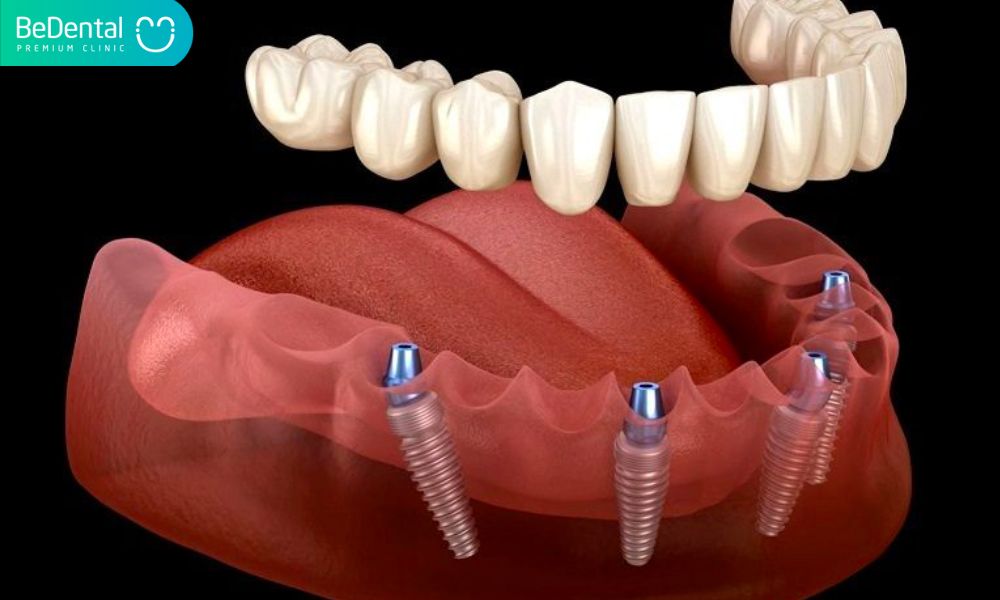
Your dentist, hygienist, or implant restoration expert may advise any or all of the following oral hygiene techniques depending on the kind of implant replacement you have.
- Use a high-quality electric toothbrush, and use it twice dai bly for two minutes each.
- Use an interdental brush to clean the implant abutment on both sides.
- Update to a water flosser to clean the gums surrounding each implant and underneath fixed appliances.
- Once or twice daily, rinse your mouth with an alcohol-free, antibacterial mouthwash.
The target of your dental implant care is to prevent gum inflammation, peri-implantitis, or gingivitis, from multiplying around your dental implants. Good dental implant care is crucial since peri-implantitis is one of the main reasons implants fail.
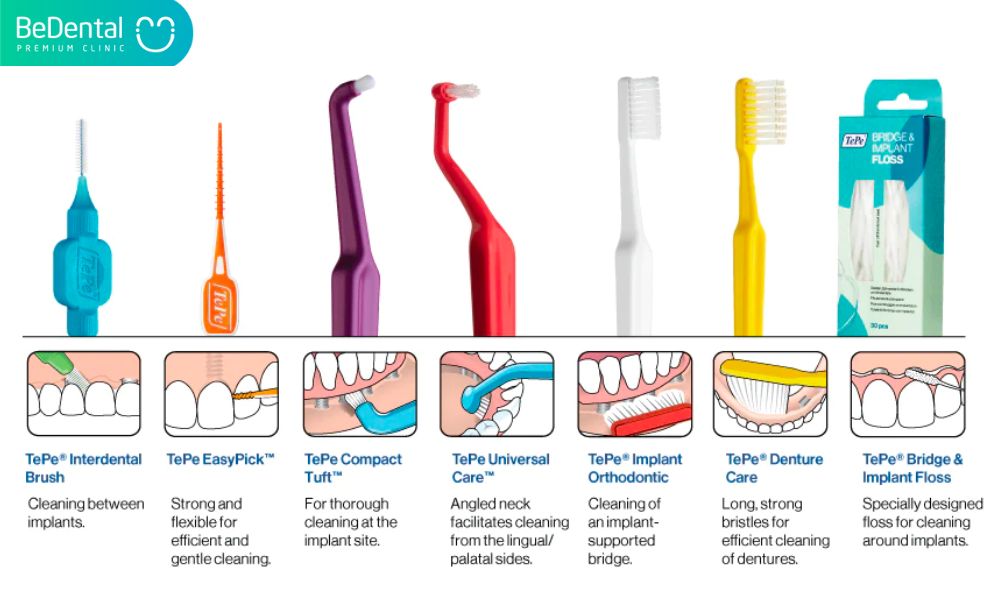
Tips to Prolong the Life of your Dental Implants
Your Aria Dental implant dentist will help ensure you keep your mouth healthy, but daily implant maintenance will be up to you to do at home. Here’s the dental implant care guide you can do to make sure your implants and replacement teeth last.
Aftercare Post-Surgery
Immediately following implant surgery we recommend you avoid eating any hard foods that could damage your implant during the healing period. A soft food diet is recommended for seven days and particular care should be taken for up to 12 weeks after surgery.
Flossing & Brushing
Just like your natural teeth, the long-term health of your dental implants will depend on how well you look after them. The great thing about implants is you can care for them as you do for the rest of your teeth – with regular flossing and brushing. This cleaning will help you avoid a build-up of plaque and should be done at least twice daily. Pay special attention to areas such as the sides of your implants, as this is where food and plaque often build up.
Lifestyle Choices
The durability of your implants will not only depend on the maintenance of your teeth, but also on your lifestyle choices as a whole. One of the main factors that can trigger problems with your dental implants (and overall oral hygiene) is smoking. This is something your dentist may take into consideration when assessing your eligibility for implants at your initial consult.
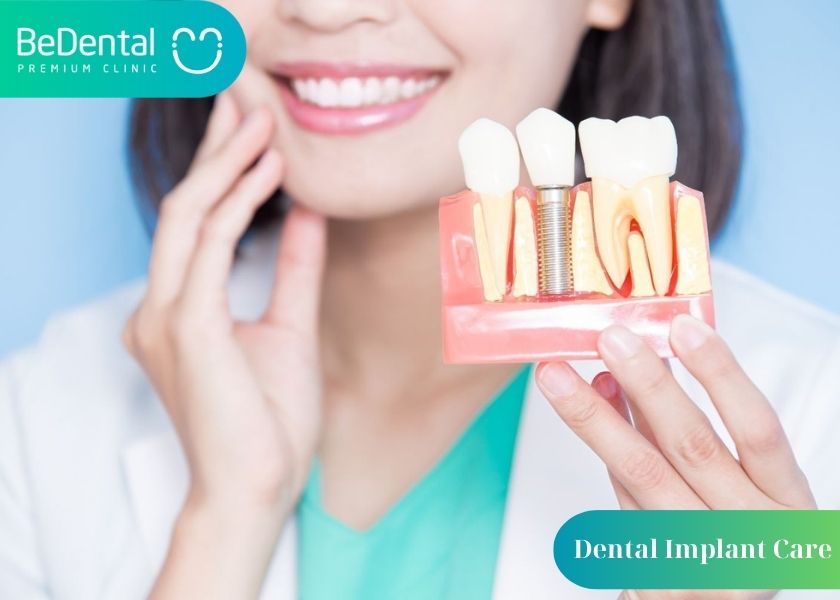
Maintaining a Healthy Mouth
The oral cavity is not mutually exclusive from the rest of your body. It is incorrect to think that if systemic health and general well-being is compromised that your oral health and dental implants are not affected. Your body works as a complete and whole system and you should care for your number one asset accordingly. If you want to maximise the health of your dental implant, make sure you stay healthy and look after yourself.
Interdental Brushes
Make sure you include interdental brushes as part of your dental implant maintenance routine. These small brushes can be used to remove pieces of food and plaque from around the sides of your implants to reduce chances of gum disease.
Mouthwash
Combined with regular flossing and brushing, antimicrobial mouthwash will help you reduce and eliminate bacteria building up around your teeth implants.
Regular Dental Visits
Commit to regular dental check-ups and hygienist appointments. This will help your dentist monitor the progress of your implants while giving your replacement teeth the professional clean they need.
Listen to Your Dentist
Most importantly, listen to your dentist’s advice on how to maintain your dental implants. Whether it’s avoiding certain foods during the healing process or following a specific cleaning routine, your dentist’s advice is imperative if you want to keep your implants for as long as possible.
Risk Factors
Some pre-existing conditions such as uncontrolled diabetes, vulnerability to gum disease, or a smoking habit can affect the health of dental implants in terms of success, complications, and longevity.
So, when it comes to dental implants start with the selection of the right dentist for you. Then by practicing good oral and dental hygiene and looking after your dental implants like your natural teeth, you will get the maximum longevity of your implant, which could potentially mean a lifetime.
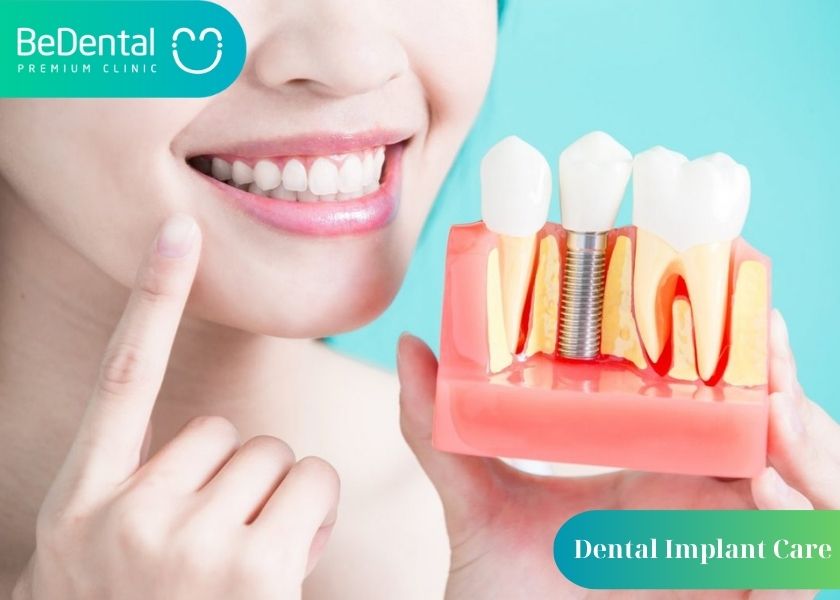
Infection Causes
Risk factors for dental implants failing, such as gum disease or poor insertion techniques, are commonly to blame. Fortunately, there are steps you can take to protect against infections and ensure that implant sites heal and integrate properly.
After receiving dental implants, up to one out of every ten patients might get infected. According to data, up to two thirds of those people will eventually have a complete failure of their dental implant treatment. Risk factors include things like smoking, periodontitis (gum disease), and infection.
Patients can lower their risk of infection or the failure of their treatment investment by keeping a healthy oral environment before and after dental implant installation.
Q&A: Dental Implant Care and 6 Common Concerns
Can you polish dental implants?
Instead of using a brush, implants can be thoroughly polished using a nonabrasive paste and a soft rubber cup. A soft polishing tip can be used in areas where a rubber cup won’t fit. There are several polishing materials that should not be used on teeth, implants, or aesthetic restorations.
How do you remove plaque from implants?
The dentist may advise the patient to use an antibiotic gel or rinse rather than clean the region of the mouth where the implant is while it heals. Dental implants can be gently cleaned with a very soft toothbrush and antimicrobial toothpaste after the initial healing phase.
What is the best toothpaste for dental implants?
The best toothpaste for dental implants is non-abrasive tartar control toothpaste. Avoid toothpaste that contains baking soda, excessive fluoride, and products made for smokers. Flossing once or twice a day is essential to taking care of dental implants since it is particularly vital to clean in between teeth.
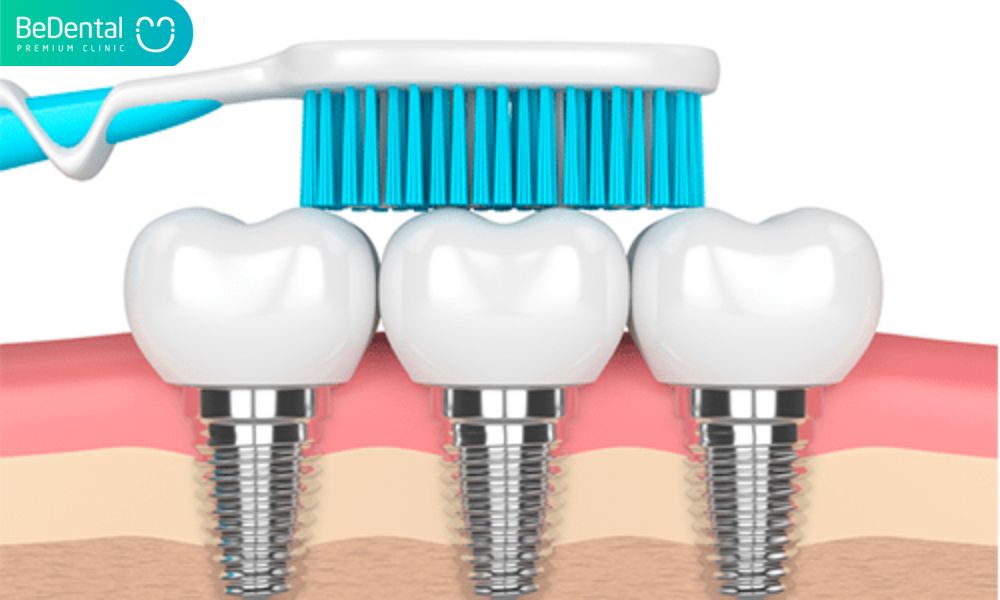
Can you use mouthwash with implants?
You should stop from using mouthwash for around a month following dental implant surgery. You should also refrain from actively spitting or swishing in the days just after surgery since this might irritate the surgical site.
Is dental implant care hard to keep clean?
Cleaning the surfaces that keep the implant in place have been microscopically roughened. Despite the fact that dental implants might be challenging to clean, studies have shown that they nevertheless have a very high success rate.
The above article has helped you reveal everything about dental implant care. Contact Bedental if you want advice on appropriate methods to have more precious information, we will provide free help 24/7.
See more
Teeth Whitening: Price, Procedure And Everything You Need To Know
Tartar and 6 ways to prevent its return
Composite Veneers and 3 exceptional advantages of Composite Veneers
- The advantage of this method is to restore chewing ability, high aesthetics, prevent complications of tooth loss, preserve maximum real teeth, long life, suitable for many cases of tooth loss.
- Disadvantages of this method are high cost, long implementation time and high technical requirements.
- The cost of dental implants is about 26,000,000 - 45,000,000 VND (single implant) and about 170,000,000 - 325,000,000 VND (full jaw implant).
- Restoration time ranges from 3 - 6 months.
- Requires a highly qualified Doctor: The dental implant process requires a high level of expertise from the doctor to ensure success and avoid unwanted risks.
- Long treatment time: The dental implant process can take a long time, requiring patience from the patient
- Relatively high cost: Dental implants are synonymous with high cost, which is an important factor to consider when choosing a method.
- Tooth longevity: Implant teeth may not have the same lifespan as natural teeth, usually after 5 - 20 years a new porcelain tooth is needed.
- Although there are certain limitations, this method is very effective when performing dental restorations. Dental Implants have the ability to completely restore shape and function like a real tooth
Tư vấn chuyên môn bài viết:
BÁC SĨ DƯƠNG THỊ THÙY NGA






Pingback: Zirconia Prosthetics Used to Treat Cavities and Tooth Sensitivity – Be Dental